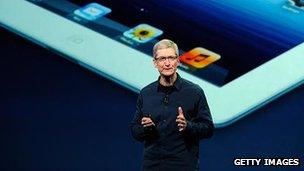Apple's Tim Cook rejects idea of laptop-tablet hybrids
- Published

Mr Cook said if Apple mixed its laptop and tablet designs it would end up with a compromised product
Apple's boss has dismissed the idea of mixing laptops and tablets into a hybrid product.
Chief executive Tim Cook said the idea of combining the iPad and MacBook Air would "wind up compromising" both.
Rival Asus already markets such products in its Transformer series. Intel has also been a vocal advocate of the idea.
Mr Cook also said he hated litigation, signalling a willingness to settle patent disputes.
It comes after Apple reported its profits almost doubled in the first three months of the year and it sold 11.8 million iPads, 150% more than the same period last year.
Toaster-refrigerator hybrids
When asked if Apple planned to build a notebook that closed "in a clever way" to let it be used as a tablet, Mr Cook attacked the idea.
"Anything can be forced to converge," he said in a conference call after the results, as transcribed by <link> <caption>financial news website Seeking Alpha</caption> <url href="http://seekingalpha.com/article/524451-apple-s-ceo-discusses-q2-2012-results-earnings-call-transcript?part=qanda" platform="highweb"/> </link> .
"But the problem is that products are about trade-offs, and you begin to make trade-offs to the point where what you have left at the end of the day doesn't please anyone.
"You can converge a toaster and a refrigerator, but those things are probably not going to be pleasing to the user.
"We're not going to that party... others might from a defensive point of view."
The statements contrast with Intel's vision of the future. The chipmaker makes the processors that power Mac computers, but not its tablets and phones.
Intel showed off a prototype laptop that converted into a tablet at the Consumer Electronics Show in Las Vegas in January. Earlier this week its PC business chief told the BBC it still believed the concept would prove popular with users of Microsoft's next operating system.
"As touch become more ubiquitous across Ivy Bridge platforms you don't need to carry both devices around," said Kirk Skaugen.
"With Windows 8 coming you can get the best of a mechanical keyboard, which people are telling us they don't want to give up, but when you want to get into consumption mode and read articles or the newspaper you can switch into tablet mode."
Patent lawsuit phobic
Mr Cook was also quizzed about how "flexible" he would be about the idea of using part of the firm's $110bn (£68bn) cash pile to settle some of its patent disputes.
Apple's former chief executive, Steve Jobs, famously told his biographer that he intended to "destroy Android" even if the attack on Google's operating system exhausted all of his company's savings.
But since launching a series of lawsuits against Android handset makers, the firm itself has been sued.
On Tuesday the US International Trade Commission issued a preliminary ruling stating that the firm's iPhones had infringed a patent for eliminating noise and other interference during calls, held by Motorola Mobility.
Motorola - which is in the process of being taken over by Google - has already forced Apple to halt some services in Germany.
Mr Cook sounded a conciliatory tone.
"I've always hated litigation, and I continue to hate it," he said.
"We just want people to invent their own stuff. If we could get into some kind of arrangement where we could be assured that's the case and a fair settlement of the stuff that's occurred, I would highly prefer to settle versus battle."
The comments comes ahead of a planned meeting with the boss of Samsung.
Mr Cook and Gee-Sung Choi, chief executive of Samsung Electronics, are due to appear in a San Francisco court before the end of July to discuss ending intellectual property disputes spanning nine countries.
- Published25 April 2012
- Published23 April 2012
- Published8 March 2012